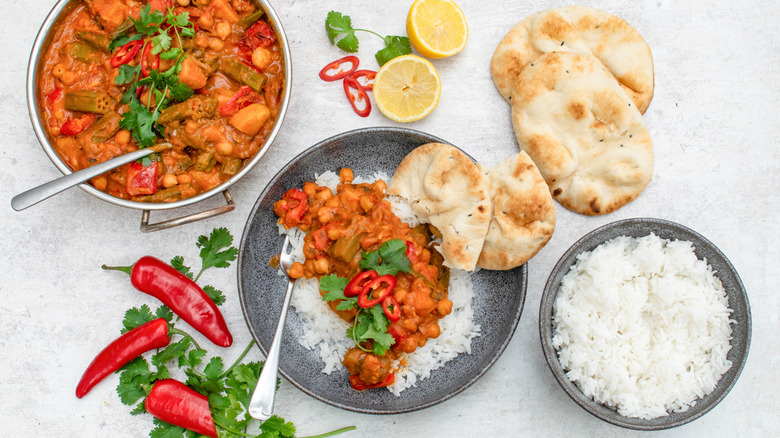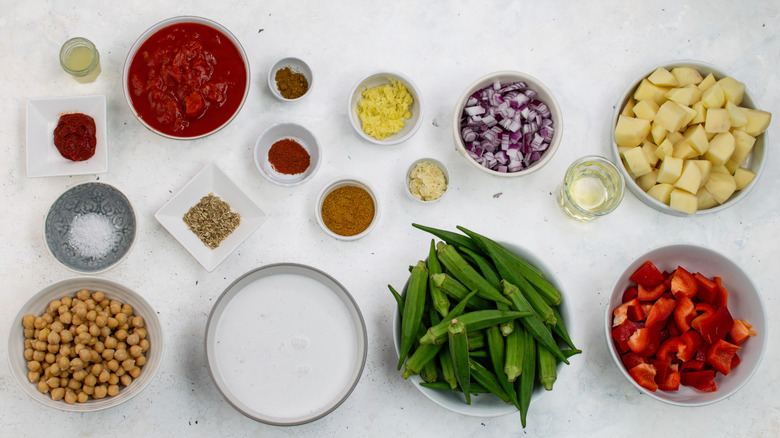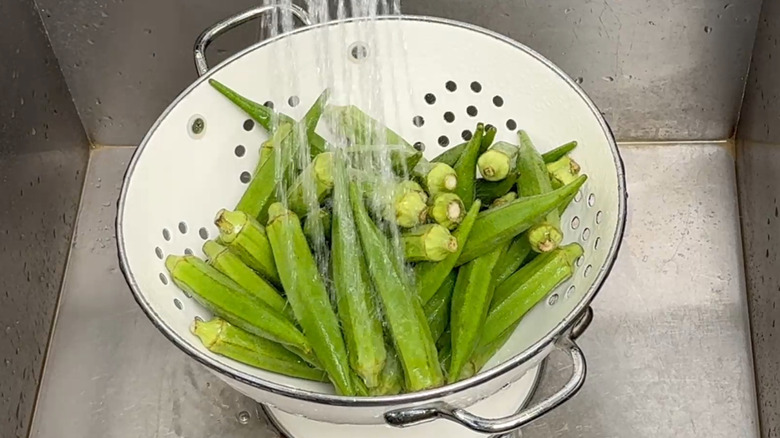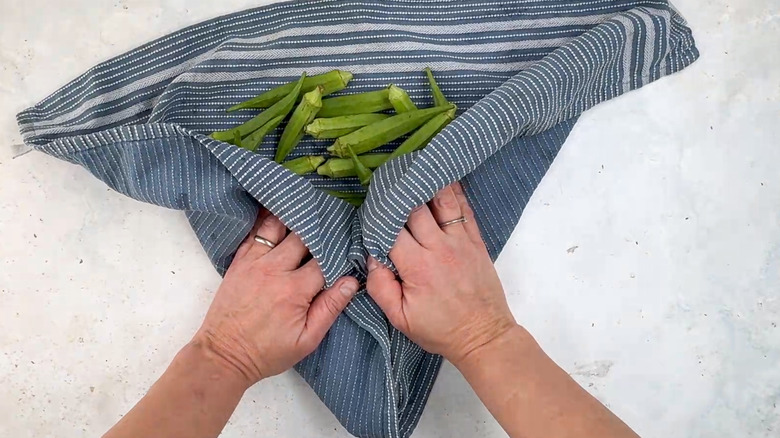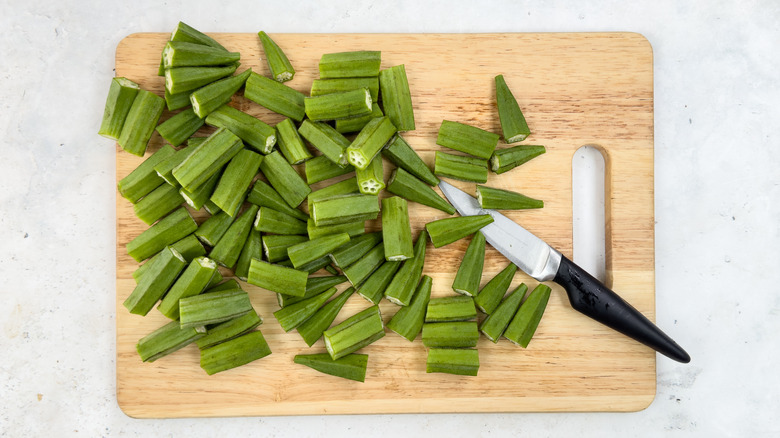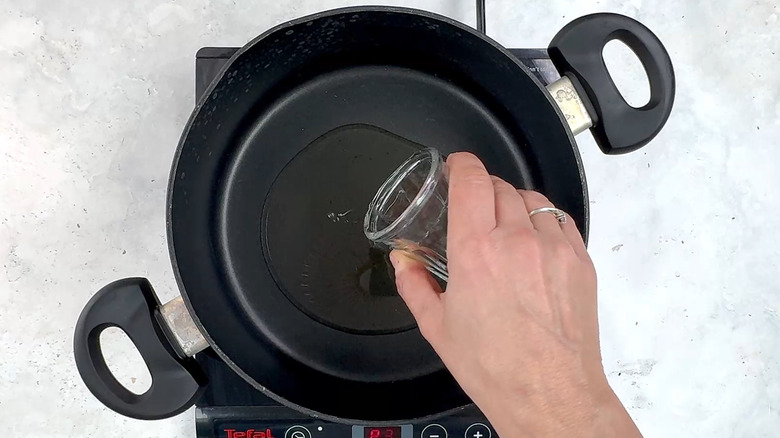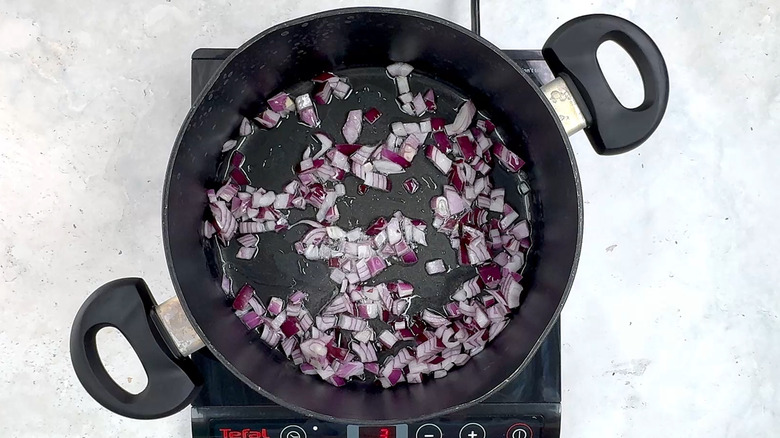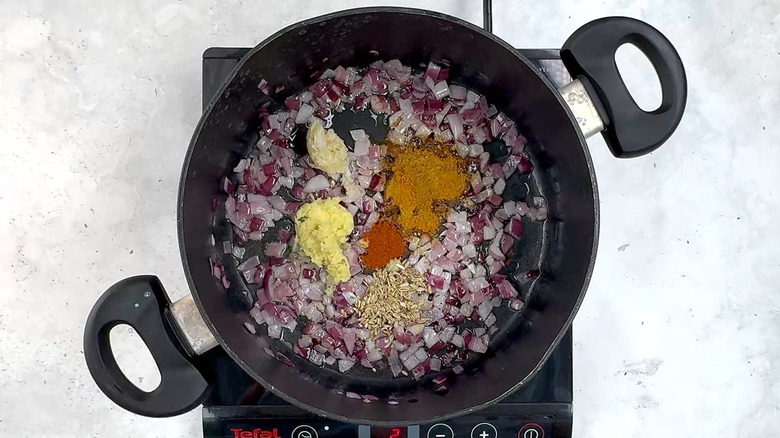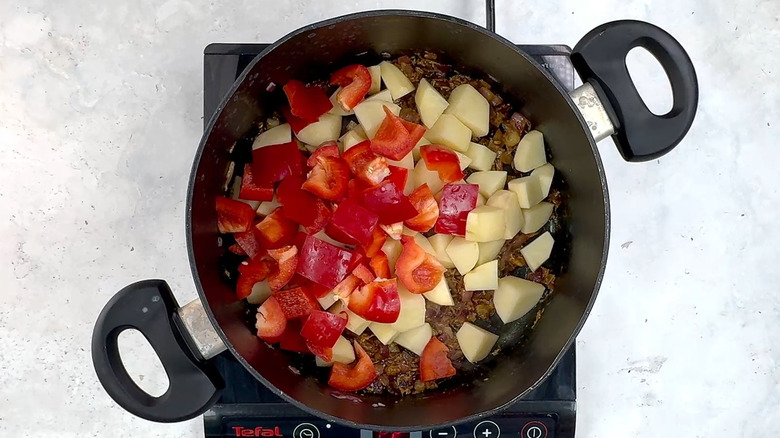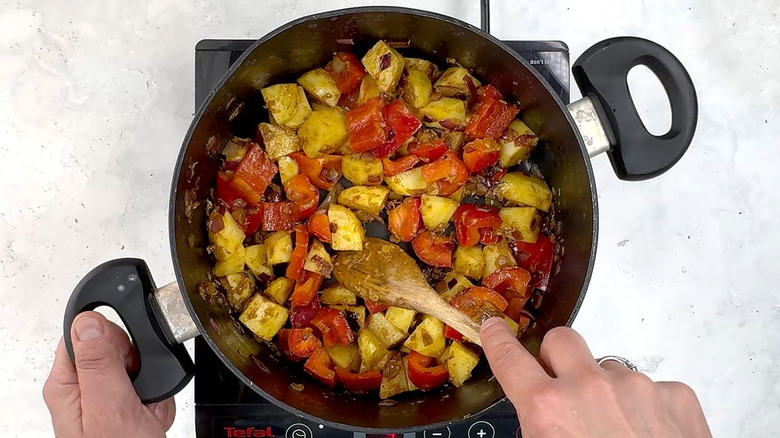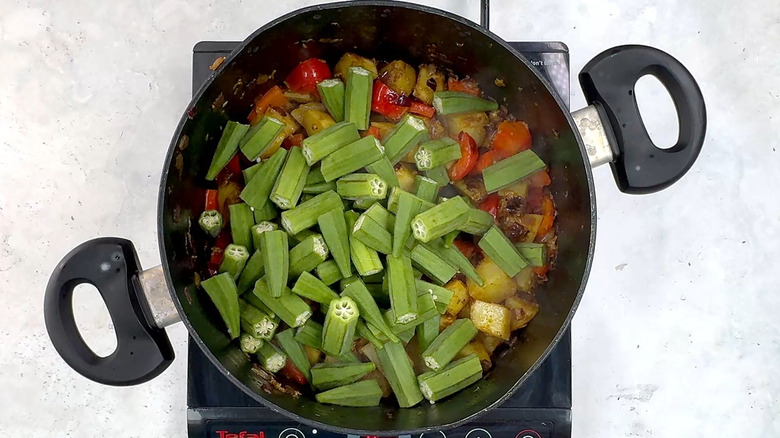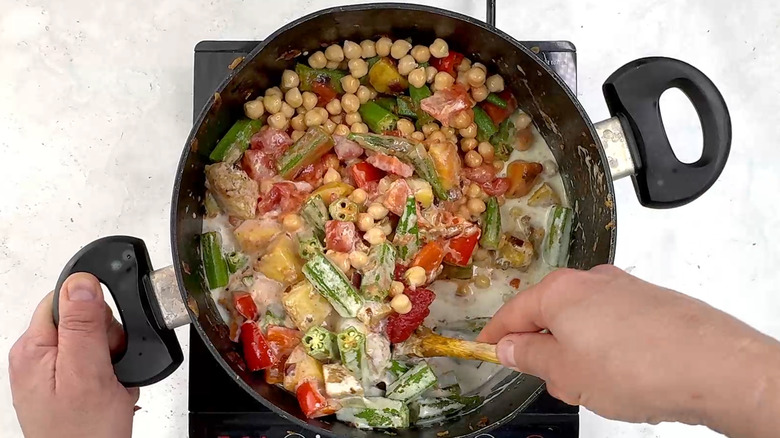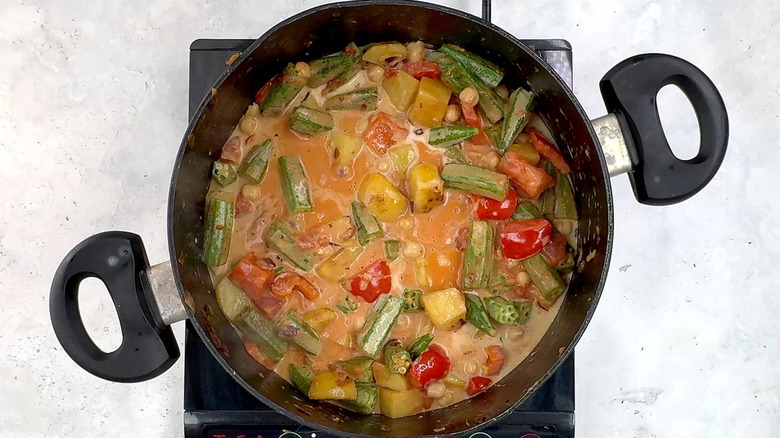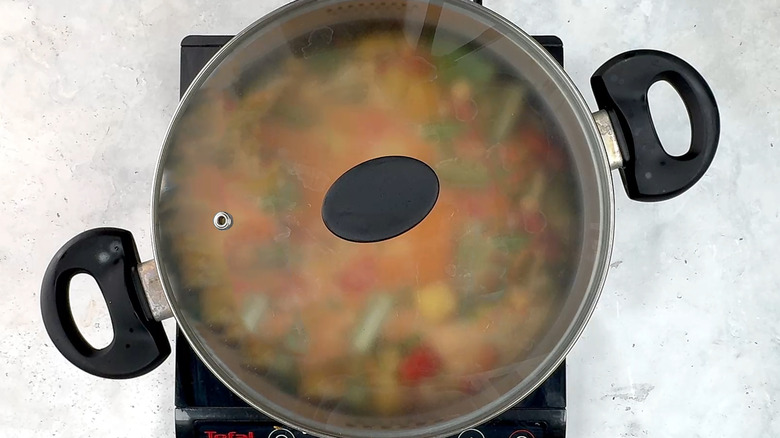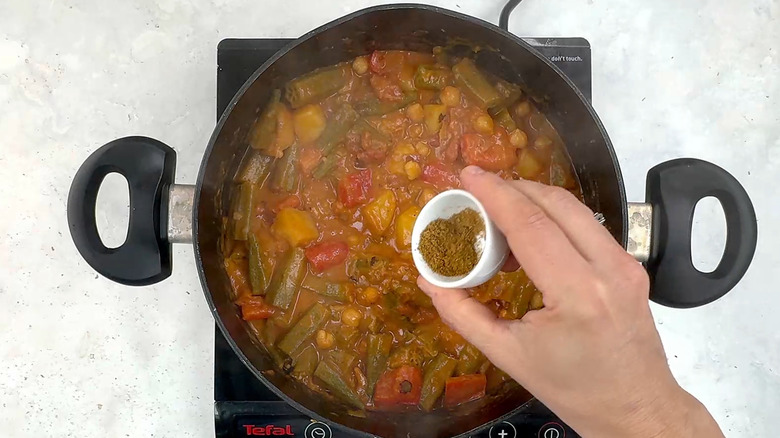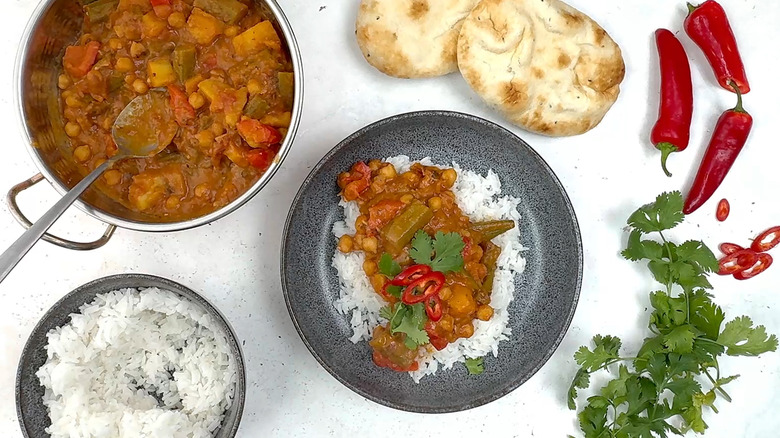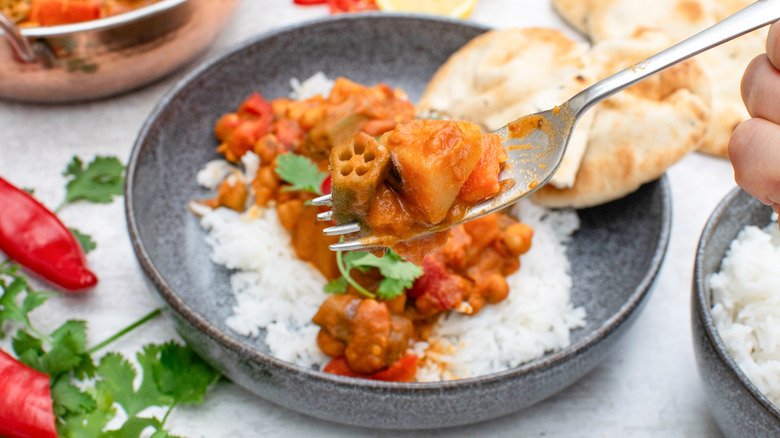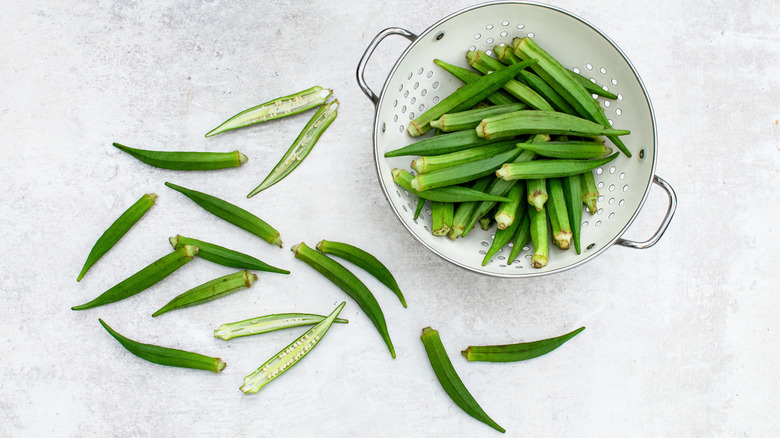Okra, Chickpea, And Potato Coconut Curry Recipe
This rich and velvety okra, chickpea, and potato coconut curry combines the unique texture of okra with hearty potatoes, sweet bell peppers, and red onions. The vegetables are simmered in a silky tomato and coconut sauce and flavored with curry powder and sweet subtle hints of fennel. Coconut milk lends a luscious creaminess and chickpeas add healthy plant-based proteins, making this vegan dish a complete meal. This curry makes a satisfying lunch or dinner that recipe developer Annabelle Randles likes to serve topped with fresh cilantro and red chile and with a side of rice and naan bread.
Randles uses a mild curry powder and adds a sprinkle of garam masala towards the end of cooking for a fresh burst of aromatic flavor. To customize the overall spiciness of this dish you can either use a hotter curry powder or add more red chile on top.
This recipe is simple enough to put together for a weeknight dinner, but if you want to prepare it in advance it can be stored in an airtight container in the refrigerator for up to 4 days. You can also freeze it for up to 3 months. If you need to adjust its consistency when reheating it, simply add some water or coconut milk.
Gather the ingredients for this okra, chickpea, and potato coconut curry
To make this okra, chickpea, and potato coconut curry recipe you will need some okra, potatoes, red bell pepper, chickpeas, canned chopped tomatoes, tomato paste, and coconut milk, as well as some red onion, ginger, garlic, fennel seeds, mild curry powder, cayenne pepper, garam masala, vegetable oil, salt, and lemon juice.
Step 1: Rinse the okra
Wash the okra.
Step 2: Dry the okra
Pat the okra dry thoroughly with a kitchen towel.
Step 3: Chop the okra
Trim both ends of the okra and cut it into 1 ½-inch pieces. Keep cleaning your knife as it gets sticky to avoid the okra getting slimy. Set aside.
Step 4: Heat the vegetable oil
Heat 3 tablespoons of vegetable oil in a large saucepan over medium-high heat.
Step 5: Fry the onion
Fry the onion until soft, about 6 minutes.
Step 6: Add the aromatics and spices
Add the ginger, garlic, curry powder, fennel seeds, and cayenne pepper, and fry for a minute or so.
Step 7: Add the potatoes and bell pepper
Add the potatoes and bell pepper.
Step 8: Fry the vegetables
Stirring regularly, fry for 10 minutes.
Step 9: Add the okra
Add the okra to the pan and, stirring regularly, fry for 5 minutes or until the potatoes are almost cooked.
Step 10: Combine the remaining ingredients
Stir in the tomatoes, tomato paste, coconut milk, and chickpeas.
Step 11: Bring to the boil
Bring the curry to the boil.
Step 12: Simmer the curry
Lower the heat to a simmer and cook covered until the vegetables are cooked, about 20 to 25 minutes.
Step 13: Season to taste
Season to taste with lemon juice, salt, and garam masala.
Step 14: Serve the curry
Serve topped with freshly chopped cilantro and chiles plus rice and naan on the side if desired.
How is okra typically used in South Asian cooking?
Known as "bhindi" in Hindi, okra is prized for its nutritional value and is a highly popular ingredient in South Asian cooking. With its notes of artichoke, asparagus, and eggplant, okra is perfectly suited to the various cuisines of the Indian subcontinent, which are characterized by their bold and rich flavors and their emphasis on fresh ingredients, seasoning, and spices. Versatile okra has a mild taste that allows it to absorb the aromas of the other ingredients it is cooked with, making it a valued addition to highly flavorful curries or stir-fries.
Some of the most popular South Asian dishes include bhindhi masala (okra sauteed with onions, tomatoes, and spices), bhindi fry (crispy okra pan-fried with spices), bhindi bhaji (okra stir-fried with spices), bhindi pakora (deep-fried okra coated with chickpea flour), or stuffed bhindi (okra stuffed with spices and nuts). For a quick and delicious snack, try okra chaat, a tasty treat of battered okra fried until crispy, then tossed with chaat masala and served with onion, tomato, and chutney.
Tips on how to avoid okra getting slimy when cooked
Okra, though delicious and highly nutritious, secretes mucilage, a viscous substance released when okra is sliced or cooked that gives it a slimy texture. While this quality can discourage some people from eating okra, several techniques can be used to reduce the viscosity of the final dish.
Moisture contributes to the sliminess of okra, so it is very important to dry it thoroughly before using it. To minimize the release of mucilage, Randles always cooks okra alongside acidic ingredients like tomatoes or lemon juice. Randles also prefers to chop the okra as little as possible and recommends cleaning your knife regularly as it gets sticky. Stir-frying okra at high heat for a short duration will also help improve the consistency by making it slightly crispy. Alternatively, you can blanch it in salted water before shocking it in iced water.
While these preparation and cooking techniques will help reduce the sliminess of okra, they won't eliminate it entirely. However, when minimized, you can embrace the texture and use it to your advantage. Mucilage is a natural thickening agent, and moderate amounts will add depth and richness to your gumbos as well as stews, curries, or soups.
Okra, Chickpea, and Potato Coconut Curry Recipe
Okra, chickpea, and potato coconut curry is a flavorful and satisfying vegan meal that makes a complete a weeknight dinner with rice and naan.
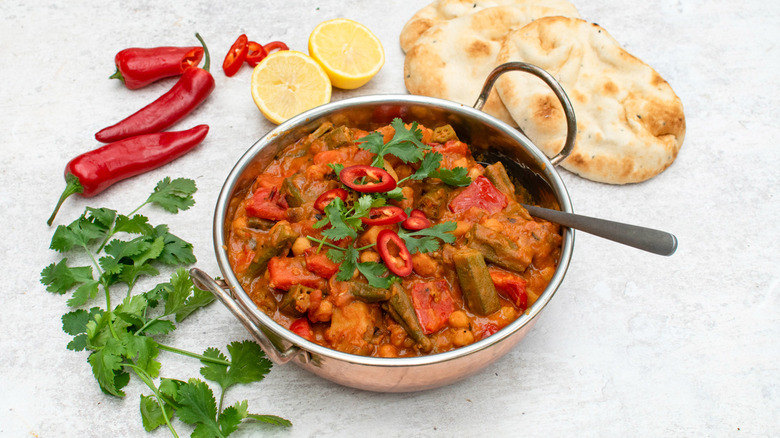
Ingredients
- 10 ounces okra (about 4 cups once cut in 1 ½-inch pieces)
- 3 tablespoons vegetable oil
- 1 cup finely chopped red onion
- 1 tablespoon grated ginger
- 3 garlic cloves, grated
- 1 tablespoon mild curry powder
- 1 teaspoon fennel seeds
- ¼ teaspoon cayenne pepper, or to taste
- 1 pound potatoes cut into ¾-inch dice (3 cups)
- 1 large red bell pepper, cut into 1-inch dice (2 cups)
- 1 (14-ounce) can chopped tomatoes
- 1 tablespoon tomato paste
- 1 (14-ounce) can coconut milk
- 1 (14-ounce) can chickpeas
- Lemon juice, to taste
- Salt, to taste
- ¼ teaspoon garam masala, or to taste
Optional Ingredients
- ¼ cup chopped cilantro, or to taste
- 1 chopped red chile
- Cooked rice
- 4 naan
Directions
- Wash the okra.
- Pat the okra dry thoroughly with a kitchen towel.
- Trim both ends of the okra and cut it into 1 ½-inch pieces. Keep cleaning your knife as it gets sticky to avoid the okra getting slimy. Set aside.
- Heat 3 tablespoons of vegetable oil in a large saucepan over medium-high heat.
- Fry the onion until soft, about 6 minutes.
- Add the ginger, garlic, curry powder, fennel seeds, and cayenne pepper, and fry for a minute or so.
- Add the potatoes and bell pepper.
- Stirring regularly, fry for 10 minutes.
- Add the okra to the pan and, stirring regularly, fry for 5 minutes or until the potatoes are almost cooked.
- Stir in the tomatoes, tomato paste, coconut milk, and chickpeas.
- Bring the curry to the boil.
- Lower the heat to a simmer and cook covered until the vegetables are cooked, about 20 to 25 minutes.
- Season to taste with lemon juice, salt, and garam masala.
- Serve topped with freshly chopped cilantro and chiles plus rice and naan on the side if desired.
Nutrition
| Calories per Serving | 595 |
| Total Fat | 35.4 g |
| Saturated Fat | 19.8 g |
| Trans Fat | 0.1 g |
| Cholesterol | 0.0 mg |
| Total Carbohydrates | 63.0 g |
| Dietary Fiber | 15.8 g |
| Total Sugars | 12.5 g |
| Sodium | 1,357.1 mg |
| Protein | 15.0 g |
